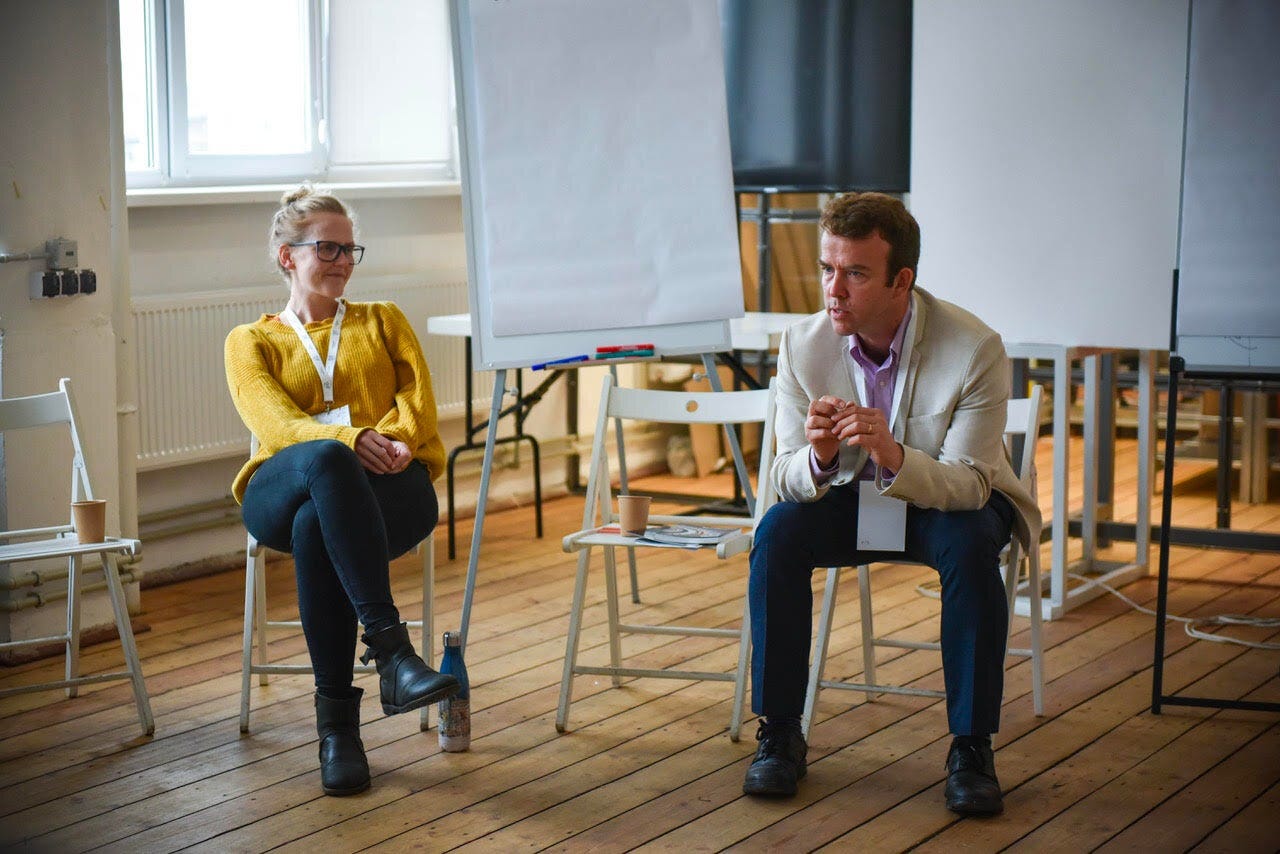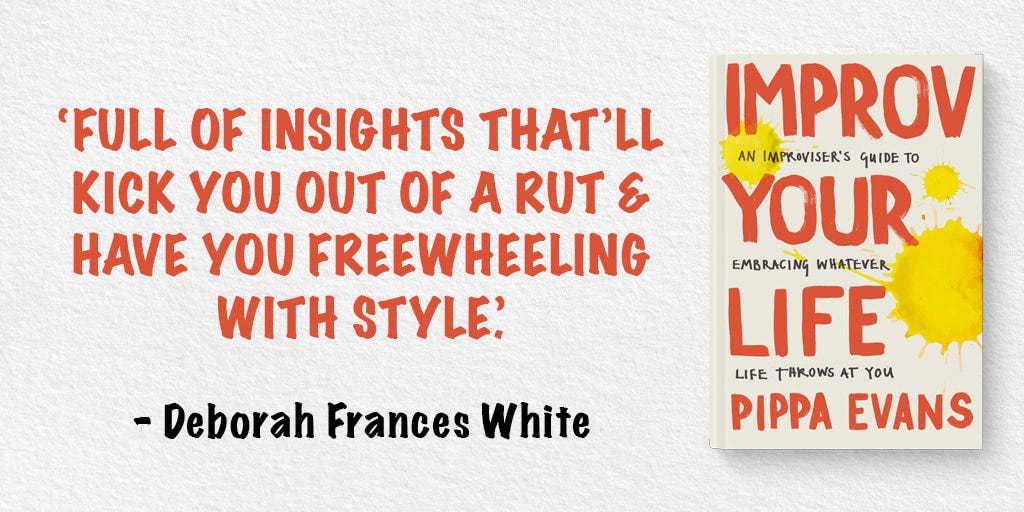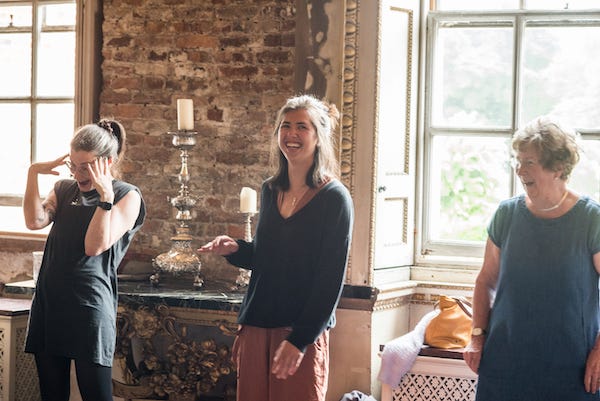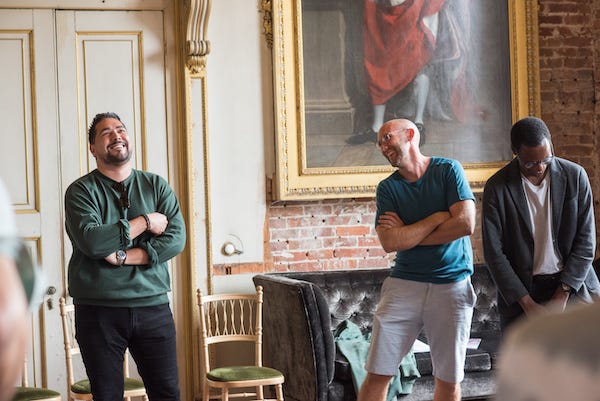An Omniscient God Cannot Laugh
Improvisation, Improvision, and the importance of surprising ourselves.
I wrote Taking Improvisation Seriously for the Perspectiva substack earlier today. I am sharing it here unchanged (except for a different title) for three reasons.
First, the post is about improvisation, a key part of the praxis of The Realisation Festival that I help organise, where we are keen to sell the final few tickets before settling into final plans and I want to give my subscribers a chance to attend.
Second, I write about Pippa Evans here, and there is a piece of writing by Pippa included but when she read the whole post she noticed that three times I made a typo by writing improvisation as improvision (now corrected). We both realised (though Pippa got their first!) that improvision is a rather beautiful word, and perhaps a useful coinage, so I wanted to get it out there immediately. Although it’s another post for the future, perhaps one of the consequences of practising improvisation is that you improve your improvision, which I would provisionally define as the capacity to perceive the possibilities of the present moment with a generative love that improves its potential (because you are one of many dynamic variables within it).
Third, the overlap between my personal substack account here and my Perspectiva substack is - to my surprise - only about 10% of readers, so most of you won’t otherwise see this post, and I think you’ll like it (and do sign up for Perspectiva please - my day job).
Don’t mistake my frivolity for shallowness, and I won’t mistake your seriousness for profundity. - Herbert Spencer.
I am delighted to introduce a guest post written by the performer, improviser, author of Improv Your Life, co-founder of The Sunday Assembly, a key part of the Realisation Festival team, mum, writer, comedian, undercover grown-up, radio and television personality, and long-standing Perspectiva Associate, Pippa Evans.
Pippa is not just a star but a constellation, and I’ve been grateful for her friendship, support, occasional sharp criticism, hours of laughter, and inspiration over many years.
Pippa writes below about why improvisation is a core part of The Realisation Festival. The whole organising team agrees, but you’ll have to sign up for the festival to experience improvisation for yourself, both watching it and learning how to do it. I add a short addendum after Pippa’s post, indicating why improvisation might be the sine qua non of social practice at this stage of history, essentially because it reveals and changes our relationship to time and agency and helps us come unstuck.
For those unaware of the annual festival Perspectiva helps bring into being, it is on June 27-30th this year, and there are still a handful of tickets left. This short video gives the jist of it and features a shirt I’ll probably never wear again.
**
Pippa was Perspectiva’s Creative Director back in the day. At our first public event in 2017, she designed and facilitated a process of embodied and relational inquiry to help bring the conceptual material alive in a post-conceptual way. Back in 2017, ‘The 6 E’s’ were a memory-aide heuristic to explore the interaction between the economic, ecological, ethical, existential, epistemic and emotional dimensions of the world’s major challenges, and you get some sense of how Pippa brought that to life here.
This spirit of praxis - practice informed by theory and vice versa - is close to Perspectiva’s heart, and a big part of the offer at Realisation.

When I first met Pippa she was in the middle of a huge explosion of interest in The Sunday Assembly around 2013, a venture she spoke about at a previous festival here. While Pippa has the subversive skill of a comedian she wears other hats and prefers to see herself as a ‘performer’. She has also gradually acquired particular expertise in improvisation, which she consolidated in her book, Improv your Life.
Improvisation is an art form to grow into and it needs to be experienced to be known. There are building blocks however, including learning what it means to ‘take space’, ‘hold space’, the issue with no, the need for yes, and why ‘yes, and’ is usually, but not always, preferable to ‘yes, but’. Pippa is also keen to encourage people to
Be Obvious. Your Obvious.
It is easy to forget that while the things we keep thinking, feeling and saying may be boring for us, they can be a revelation to others for whom they’ll be relatively fresh.
The book includes the following amusing and instructive vignette:
A friend of mine was talking to a colleague at work about her recent holiday. My friend said, ‘We went to Spain and when we got back my dog had died’, to which her colleague replied, ‘I’ve been to Spain.’
Listening is a skill of many dimensions, not just an on-off switch, and it’s a critical part of improvisation. A key feature of improvising is listening with your whole body, including watching for signs of when and how to join in:
The first obstacle to joining in is often not being sure whose turn it is. There is a saying in improv land: ‘If you’re wondering whose turn it is, it’s yours!’.
The book is full of these prompts to attend more carefully to group dynamics and our role in them, but the full power of improvisation became clear to me when I watched Showstoppers create a whole musical from scratch based on audience prompts.
It’s rather magical, and like many forms of expertise, it’s hard to believe it is possible until you witness it. Seasoned improvisors can however create funny, insightful, tuneful and revelatory songs based on a few audience prompts. It is magical to watch, and available at the festival where Pippa will also be teaching improvisation and connecting improvisation to The Politics of Waking Up by Indra Adnan.
Pippa will be joined by other improvisers, including Jonathan Ainscough who impressed and entertained us all in 2022. This picture of Jonathan is a treat:
And here is a sample of Pippa in her element in 2019 making up a song on the spot about vegetables:
And now, finally, here is Pippa not talking about vegetables:
Why are improvisation and music such an important part of the Realisation Festival?
- by Pippa Evans
My first experience of improvisation (other than watching Whose Line Is It Anyway? on the telly) was during a stand-up comedy course in 2001. One week, the teacher said we were going to do some improv and everyone baulked at the idea. Apart from me.
I hadn't been enjoying standing up and telling jokes as much as I thought I would, so a chance at something, anything else, probably appealed. I found myself most alive when immersed in the moment, responding to what was happening around me, working with a team. Wait a minute!!?? Isn’t that a philosophy for life? I should say so.
The art of improvisation is fascinating, not only as an imagination exercise but as a modus operandi for the day-to-day. I continue to be fascinated by it, 23 years after my first encounter. I started in improvised comedy, moved to improvised musicals and now seem to have landed in improvised democracy. I haven’t left those other places behind, by the way. They all come with me, wherever I go, adding to my backpack of experience. I have no doubt that improvised comedy has its value within improvised democracy. It may currently be the thing most missing from our political dialogues.
Improvisation is ‘the art of working with whatever is available to you in the moment.’
“Naaa, you’re just winging it!” people shout - but it couldn’t be further from the truth. It is about trusting that you can bring something to the table, that others will bring what is missing and that together, you can create something greater than the sum of your parts.
Improvisation is about moving forward, collectively. It is about trusting your knowledge from the world you inhabit. It is the art of spontaneous wisdom. In an ever-shifting world, being OK with not knowing everything, but bringing something, is one of the most valuable skills we can hone.
The Realisation Players will be bringing improvisation to the weekend in the form of music, comedy, workshops and other forms that haven’t been discovered yet. They will present themselves, emerging from the dynamics of the 150 people gathering at St Giles. We will also be partnering with Indra Adnan for a workshop on improvisation as a praxis for the Politics of Waking Up. We are so excited to be entrusted with responding to what emerges over the weekend. There will be a chance to deep dive into the practise, to witness improvisation as a performance, and to join with each other in spontaneous song.
The Realisation Festival will be tackling some big topics. Deep Questions. Sage words. It could get heavy at times. In fact, I am sure it will. But it need not be tears of despair rolling down our faces. May we also have tears of laughter. May we feel confused and lost and vulnerable whilst we twirl and skip and giggle. May we clash on differing ideals and then sing, from different hymn sheets, together.
Improv is the art of being OK when the plan takes an unexpected turn.
Improv is the art of trusting your skills and your gut.
Improv is the art of knowing yourself and being able to work in relationship with others.
Improv is the art of failing forwards by embracing and reframing wisdom which appears in the form of a mistake.
Improv is the art of Yes and No and all that lies in between.
Improv is being able to leave the space and know you have given all you can in that moment.
Improv is celebrating the brilliance of others without feeling that it diminishes your own.
Improv is a world that is accessible to all, embracing of fear and full of hope.
For without hope, we cannot improvise.
Looking forward to making things up with you all.
Best wishes
Pippa
p.s. If you would like to see some musical improv in action, here is a video of me as a rock star giving romantic advice during a performance of Showstopper! The Improvised Musical.
It's not too late to book your place at the Realisation Festival: find out more.
A key part of improvisation is knowing when to stop, so feel free to consider this the end, but if you’d like an encore (More! More!) or if you’re in a ‘Yes, and’ kinda mood, there’s some Perspectivan dessert below.
Addendum: An Omniscient God Cannot Laugh.
I can’t currently find the source for the quotation, and I think it might be Cynthia Bourgealt, but I recently came across the line:
“An omniscient God cannot laugh.”
Some see God in austere terms, and I can’t speak for every believer, but personally I can’t get too excited about any God - existent or imaginary - that doesn’t laugh, either in some literal physical sense or through some mysterious divine cosmic grammar.
Every time we laugh we step out of a structure, and laughter can be thought of as a low-level everyday spiritual experience, a glimpse of the freedom that is part of our true nature.
So that line about omniscience knocked my head back in a good way and is relevant to improvisation's power. There is something about not knowing what is going to happen next that is fundamental to the human experience, and it is a critical element of humour, which, along with text, technology, long childhoods, and a weakness for self-destruction, is what marks us out as a species.
Not knowing everything is a precondition for finding something funny because otherwise there would no subversion, surprise, absurdity, excitement, or spontaneity. So assuming we want God to exist, we probably don’t want her to know everything.
Improvisation is fun and rewarding, but it’s more than that too - it’s a method of inquiry into the moment. And why does the moment matter? Because in a sense now is all we ever really have to work with. While we can interrogate nowness with meditation we can also inquire into it in more socially interactive and playful ways, and indeed we may have to.
Jean Gebser highlighted that our current mental-rational structure of consciousness is in its deficient mode, which is partly why the world appears to be becoming less intelligible. He said that the emerging Integral structure of consciousness would have the character of time-freedom and Perspectiva explored this in our work on temporics last October.
I believe improvisation gives us a taste of the challenge is to refocus on the question of where the future resides in us, and there’s a lovely quote that captures this:
The future enters into us, in order to transform itself in us, long before it happens.- Rainier Maria Rilke, Letters to a Young Poet (1929)
Gebser called this latency and it refers to things that are real but concealed and yet are full of potential.
As we free ourselves from our attachment to crisis we pay more and better attention to what crisis thinking may unhelpfully perpetuate or occlude. For instance, we may start to attend better to what Bonnitta Roy calls ‘complex potential states’, Nora Bateson calls Aphanipoiesis and Indra Adnan calls Ada! These are different ideas, though I don’t think it’s entirely incidental that they come from women, and draw attention to the value of what is latent, unseen, and yet perceptible through the kinds of subtle and appreciative inquiry that are precluded by the ‘I-can-fix-it’ crisis mentality.
A key part of grasping the reality of complex potential is to realise that it resides in the perception of a different quality of time.
I’m quoting from Bonnitta Roy’s chapter in Dispatches from a Time Between Worlds where she references Donna Haraway’s emphasis on Kainos (not Kairos!) in Staying with the Trouble(2016).
The Greeks had two words for time:
Note the contrast with Kairos being ‘saturated with resonance and meaning’ while Kainos is ‘the sense of thick ongoing presence’. Later Bonnie says: “Kainos means each moment is replete, and precious and precarious.”
I’m fine with Chronos, and I’m all for Kairos, but Kainos is just as important, and today perhaps more so, because it gets us beyond the sequential limits of Chronos, and the Weight of Kairos, back to the lightness and potential that can lead to the spirit of freshness and renewal through which a transformed world might be brought into being.
Again quoting from Bonnie’s chapter:
Gebser called for a new kind of statement “to make the strength of spirit perceptible” to express the energies of the psyche, the self, the soul and the culture. He declared that philosophy based on abstract representations was coming to an end and that the new form would render spirit transparent to us, would allow it to enter our awareness directly. Gebser experienced his own time as in between worlds. He understood the need to address the inherent fatalism at the heart of our relationship with time
At the end of Bonnitta’s chapter, she puts this poetically, and indicates that the heart of our historical challenge may be to become better improvisers:
What then must we do? We are the people to create enduring acts of inspiration and imagination for others to find when this world finally comes to an end. These will be seeds that can grow in the next world, but not in ours. We will never see them bloom. It would be like planting a Tamarack in the Pleistocene for someone today. We are the people to do this religiously, but not with messianic fervor, rather with loving care, trusting that our purpose is not of this world and for us, but of the next world and for them.Who are we, then, these people assembled at the end of the world?
I believe there’s an important relationship between the practice of improvisation, the experience of Kainos, and the vitality of regenerative culture, and this is something we’ll be exploring at this year’s festival. I am not saying that improvisation is the only way to renew our relationship to time, nor that it automatically saves the world from itself, but I believe it’s a great place to start.
**
It's not too late to book your place at the Realisation Festival: find out more.












To know everything yet do little, to learn by keeping within the lines of a colouring book.